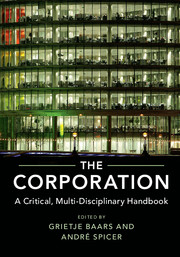Book contents
- Frontmatter
- Contents
- List of Contributors
- Acknowledgements
- Introduction: Why the Corporation?
- PART I DISCIPLINARY OVERVIEWS
- PART II INTERDISCIPLINARY THEMATIC CHAPTERS
- 1 The Evolution of the Corporate Form
- 2 The Multinational Corporate Group
- 3 The Financialization of the Corporation
- 4 Corporate Value Chains
- 5 Corporate Citizenship
- 6 The Corporation and Crime
- 7 The Corporation and Ideology
- 8 Corporation and Communities
- 9 Corporations and Resistance
- 10 Alternatives to the Corporation
- a Resisting and Regulating Corporations through Ecologies of Alternative Enterprise: Insurance and Electricity in the US Case
- b The Psychological Crisis of the Corporation: Employee-Owned Alternatives and Futures
- c Organization Is Politics Made Durable: Principles and Alternatives
- Index
- References
a - Resisting and Regulating Corporations through Ecologies of Alternative Enterprise: Insurance and Electricity in the US Case
from 10 - Alternatives to the Corporation
Published online by Cambridge University Press: 31 March 2017
- Frontmatter
- Contents
- List of Contributors
- Acknowledgements
- Introduction: Why the Corporation?
- PART I DISCIPLINARY OVERVIEWS
- PART II INTERDISCIPLINARY THEMATIC CHAPTERS
- 1 The Evolution of the Corporate Form
- 2 The Multinational Corporate Group
- 3 The Financialization of the Corporation
- 4 Corporate Value Chains
- 5 Corporate Citizenship
- 6 The Corporation and Crime
- 7 The Corporation and Ideology
- 8 Corporation and Communities
- 9 Corporations and Resistance
- 10 Alternatives to the Corporation
- a Resisting and Regulating Corporations through Ecologies of Alternative Enterprise: Insurance and Electricity in the US Case
- b The Psychological Crisis of the Corporation: Employee-Owned Alternatives and Futures
- c Organization Is Politics Made Durable: Principles and Alternatives
- Index
- References
Summary
Little ‘r’ republicanism has proven a resilient animating theme in struggles over corporations and economic order in the United States, with its producerist visions of economic autonomy, self-governing communities and egalitarian, regionally based, small-stakeholder economies of yeoman farmers and independent producers. Indeed, republican–producerist projects of reforming and reconstructing American capitalism have figured centrally in seemingly quite disparate places, ranging from nineteenth- and twentieth-century struggles over banking and railroads, the agrarian revolts and various strands of unionism to the local foods movement and even faith-based organizing (Goodwyn, 1976; Hattam, 1990; Voss, 1993; Berk, 1994; Donohue, 1999; Schneiberg, 2002; Marquis and Lounsbury, 2007). As the Table 37.1 suggests, even in the US, that ‘wellspring of corporate capitalism’, producer groups, farmers, workers, consumers and public officials have been remarkably varied in how they have worked to contest corporations and realize republican aspirations for more decentralized development. These groups have deliberately sought to reform markets and corporations via overlays of organizational control, whether through the regulatory state, in the form of independent commissions or mandatory disclosure, or through private governance, ranging from self-regulatory associations and third-party certification to consumer boycotts and collective bargaining. They have also used state power to directly recompose the architectures of markets and corporations, via anti-trust policies, corporate charter reform, regulation or even (rarely and briefly) nationalization.
This chapter fills out the table by analysing an important but less well appreciated strategy for contesting corporations and reconstructing capitalism along republican lines: working mostly outside central states or formal political institutions to recompose markets directly by organizing parallel systems of cooperative, mutual and local/state-owned enterprise. The heart of this strategy is to complement, compete with or bypass for-profit stock corporations by self-organization among producers or consumers and by cultivating enterprises structured to serve different constituencies and purposes than shareholder value and financial returns for a specialized investor class.
I advance three points in the service of a broader counter-narrative about these alternative forms. First, dismissing cooperatives, mutuals and the like as relics of a small-town agrarian economy long past or as utopian experiments revived in the 1960s, underestimates not only their salience and persistence in American capitalism, but also how they stand with the regulatory state, anti-trust and private governance as vehicles for resisting corporations and pursing distinctively modern projects of development, market-making and revitalization.
- Type
- Chapter
- Information
- The CorporationA Critical, Multi-Disciplinary Handbook, pp. 512 - 526Publisher: Cambridge University PressPrint publication year: 2017
References
- 7
- Cited by



